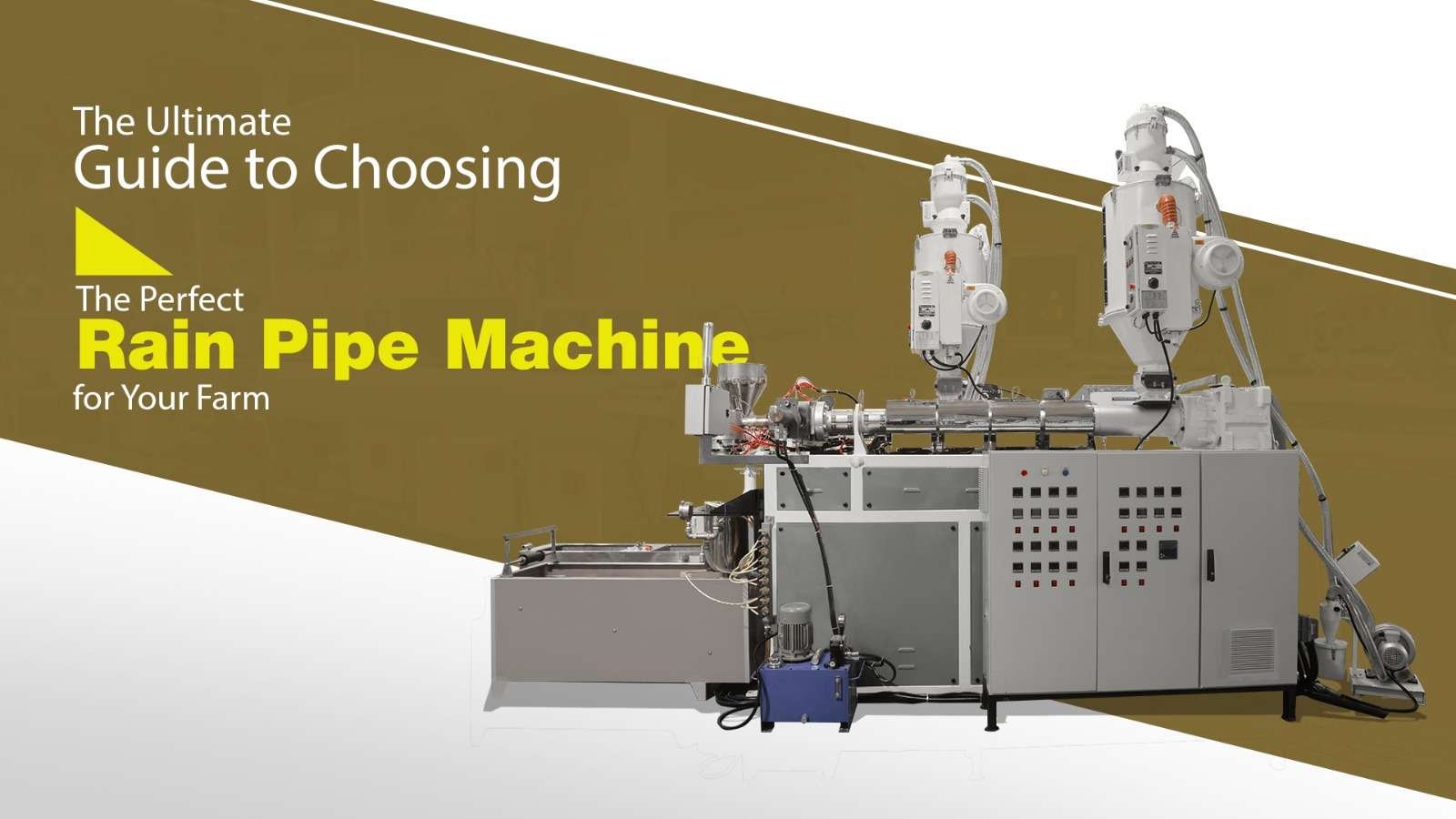Managing water efficiently is essential for successful farming. A Rain Pipe Machine is a key tool that helps farmers produce rain pipes for advanced irrigation systems. These irrigation systems provide water to crops in a way that mimics natural rainfall, which promotes healthy plant growth and saves water. This guide will explain what a Rain Pipe Machine is, how it works, the benefits it offers and how to select the perfect machine for a farm.
What is a Rain Pipe Machine
A Rain Pipe Machine is specialized equipment used to manufacture rain pipes. These pipes are perforated tubes designed to distribute water evenly in fields. The machine extrudes plastic material into pipes, then creates tiny holes using advanced technology like laser or nano punching to ensure uniform water flow. These pipes form the core of irrigation systems that provide gentle watering to crops, imitating rainfall.
How Does a Rain Pipe Machine Work
The Rain Pipe Machine processes plastic pellets such as polyethylene or PVC by melting them in an extruder. The molten plastic is shaped into pipes, which are then perforated with high precision. The machine typically includes a hopper feeder, a main extruder, a laser punching unit and winding mechanisms. The entire production process is controlled using computerized systems for accuracy and efficiency.
Important Features to Consider
To choose the right Rain Pipe Machine, farmers should focus on certain features based on their farm needs
- Production speed is measured in meters per minute Higher speed means a higher output
- Pipe diameter range to fit irrigation requirements
- Material compatibility, including virgin and recycled plastics
- Automation level, such as PLC control for better consistency
- Energy consumption for operational cost savings
- Durability and ease of maintenance for long-term use
- Output capacity in kilograms per hour matches production demand
Benefits of Using a Rain Pipe Machine on Your Farm
The integration of a Rain Pipe Machine into farm irrigation offers many advantages. Here are some key benefits of rain pipes created by this machine
- Efficient water delivery reduces waste and saves water resources
- Cost-effective irrigation requiring less energy compared to sprinklers
- Provides uniform water distribution for improved crop growth
- Helps reduce soil erosion by gentle watering, similar to rain
- Easy to install and maintain with minimal operational issues
- Versatile and adaptable to various crop types and field layouts
- Protects soil health by minimizing runoff and waterlogging
- Supports sustainable farming practices, conserving the environment
- Enhances crop yield and quality through consistent watering
- Durable pipes withstand harsh weather conditions for long life
How to Choose the Perfect Rain Pipe Machine
Selecting the ideal Rain Pipe Machine depends on several factors
- Understand your farm size and irrigation requirements. This determines machine capacity and pipe size
- Assess machine technical specifications for speed, efficiency and output
- Look for automation features that ease operation and improve quality
- Consider machines with low power consumption for cost savings
- Research the manufacturer’s reputation and after-sales service
- Think about future expansion needs and choose scalable options
Installation and Maintenance Tips
Proper installation ensures your rain pipe system works efficiently. Lay out pipes close to plant roots, avoiding sharp bends. Regularly clean filters and check pipes for clogs or damage. Schedule routine machine servicing and train farm workers on usage
Rain pipe machine manufacturers in India include JJ Industries, which is known for producing high-speed rain pipe machines designed for efficient irrigation pipe manufacturing. Their machines operate at speeds of up to 90 to 100 meters per minute with pipe diameters ranging from 20 to 63 millimeters. These machines have a production capacity of around 120 to 150 kilograms per hour. JJ Industries uses advanced extrusion and laser technology to ensure precision in pipe making. Their manufacturing unit is equipped with state-of-the-art tools and machine fabrication facilities. The company focuses on quality inspections, customized solutions and strong after-sales support, making them a reliable choice in rain pipe machine manufacturers in India.
FAQ’s:
Ans: A Rain Pipe Machine is equipment used to manufacture rain pipes, which are perforated tubes that provide uniform water distribution in irrigation systems. It melts plastic into pipe shape and uses advanced technology like laser punching to create precise holes for efficient watering.
Ans: Rain Pipe Machines typically process polyethylene and PVC plastics. Some machines can handle recycled plastics. These materials are chosen for durability, flexibility and their ability to form micro perforations for controlled water release.
Ans: Modern Rain Pipe Machines operate at speeds of 60 to 100 meters per minute with output capacity ranging from 100 to 150 kilograms per hour. The exact speed depends on the machine size, model and technology used.
Ans: Rain Pipe Machines enable water-efficient irrigation that reduces wastage, improves crop yield, saves energy and minimizes soil erosion. Rain pipes provide gentle watering that mimics natural rainfall, supporting sustainable agriculture.
Ans: Regular cleaning of filters and perforation units, timely inspection for wear and tear, routine lubrication and professional servicing help maintain machine performance. Proper training of operators is also essential for longevity.

